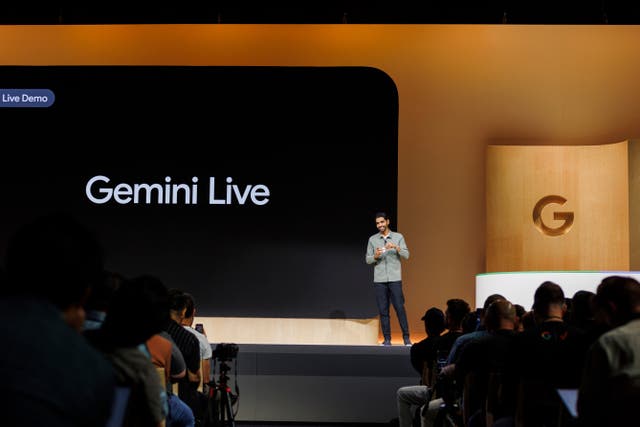Google parent Alphabet enjoys profit rise as focus on AI ‘paying off’
Both Alphabet’s profit and revenue increased at a brisker pace than industry analysts anticipated.

Google is still thriving while the company navigates through a pivotal shift to artificial intelligence (AI) and battles regulators trying to topple its internet empire.
The latest evidence of Google’s prosperity emerged on Tuesday with the release of its corporate parent Alphabet’s results for the July-September period.
Both Alphabet’s profit and revenue increased at a brisker pace than industry analysts anticipated, thanks primarily to a moneymaking machine powered by Google’s ubiquitous search engine.
Revenue rose 15% from the same time last year to 88.27 billion dollars (£67.82 billion).
“Our commitment to innovation as well as the long-term focus and investment in AI are paying off,” Alphabet chief executive Sundar Pichai said during a call discussing the results.
The profits would have been even higher if Google was not pouring so much money into building up its AI arsenal in a technological arms race that includes other industry heavyweights Microsoft, Amazon, Apple, Facebook parent Meta Platforms and rising star OpenAI.
The AI investments are the primary reason Google’s capital expenditures in the past quarter soared 62% from the same time last year to 13.1 billion dollars (£10 billion).
The AI spending is likely to stay at roughly the same level during the current October-December period, and then rise even higher next year, according to Anat Ashkenazi, Alphabet’s chief financial officer.
But Ms Ashkenazi also emphasised that the company, based in Mountain View, California, will act on cost-cutting opportunities in other areas to help boost profits.
Alphabet has already trimmed its payroll from more than 190,000 worldwide employees early last year to about 181,000 workers now.

Investing.com analyst Thomas Monteiro said Alphabet’s showing makes it likely more good news will be coming for Big Tech as this week progresses, with quarterly reports from Microsoft, Meta, Amazon and Apple still to come in the days ahead.
But a four-year-old antitrust case brought by the US Department of Justice has cast a cloud of uncertainty over Google’s future.
After weighing the evidence presented during a high-profile trial last year, a federal judge declared Google’s search engine is an illegal monopoly – a decision that has opened the door for a major shake-up.
Earlier this month, the Justice Department suggested it might seek to break up Google as part of penalties that will be determined by US District Judge Amit Mehta next summer.
Besides the legal assault on its search engine, Google has also been ordered to tear down the barriers protecting its Play Store for Android smartphone apps.
That ruling came earlier this month after a jury decided that operation also was an illegal monopoly.
Google is also nearing the end of another antitrust trial in Virginia revolving around the technology underlying its digital ad network.
For now, at least, Google remains a juggernaut.
The digital ads tied to Google’s search engine remained the financial cornerstone.
Revenue from that segment climbed 12% from a year ago to 49.39 billion dollars (£37.95 billion).
And Google’s cloud division is growing at an even more robust rate, thanks to demand for AI services.
The cloud division generated 11.35 billion dollars (£8.72 billion) in revenue during the past quarter, a 35% increase from last year.
But the regulatory questions dogging Google remain a worry among investors.
Although Alphabet’s shares have surged by more than 20% so far this year, Tuesday’s closing price of 169.68 dollars remains well below their high of nearly 192 dollars reached in July before the search engine monopoly ruling came out.





